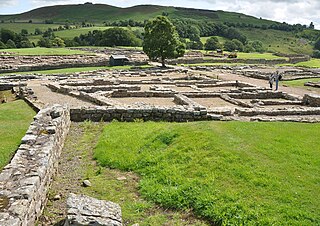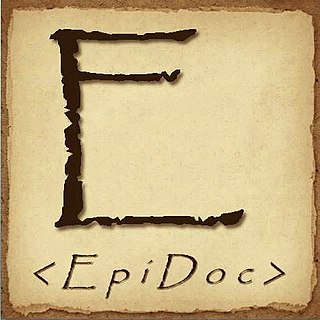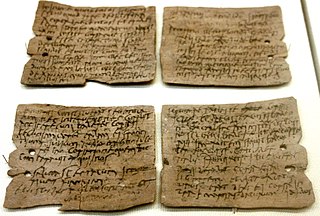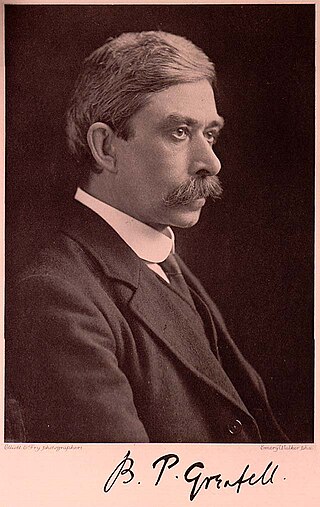Related Research Articles

Claudia Severa was a literate Roman woman, the wife of Aelius Brocchus, commander of an unidentified fort near Vindolanda fort in northern England. She is known for a birthday invitation she sent around 100 AD to Sulpicia Lepidina, wife of Flavius Cerialis, commander at Vindolanda. This invitation, written in ink on a thin wooden tablet, was discovered in the 1970s and is probably the best-known item of the Vindolanda Tablets.
Philodemus of Gadara was an Epicurean philosopher and poet. He studied under Zeno of Sidon in Athens, before moving to Rome, and then to Herculaneum. He was once known chiefly for his poetry preserved in the Greek Anthology, but since the 18th century, many writings of his have been discovered among the charred papyrus rolls at the Villa of the Papyri at Herculaneum. The task of excavating and deciphering these rolls is difficult, and work continues to this day. The works of Philodemus so far discovered include writings on ethics, theology, rhetoric, music, poetry, and the history of various philosophical schools. Ethel Ross Barker suggested in 1908 that he was owner of the Villa of the Papyri Library.
Sir Edmund Kerchever Chambers,, usually known as E. K. Chambers, was an English literary critic and Shakespearean scholar. His four-volume work on The Elizabethan Stage, published in 1923, remains a standard resource.

EpiDoc is an international community that produces guidelines and tools for encoding in TEI XML scholarly and educational editions of ancient documents, especially inscriptions and papyri.

Eric Barff Birley,, was a British historian and archaeologist, particularly associated with the excavation of the forts of Hadrian's Wall, notably at Vindolanda.

The Greek Magical Papyri is the name given by scholars to a body of papyri from Graeco-Roman Egypt, written mostly in ancient Greek, which each contain a number of magical spells, formulae, hymns, and rituals. The materials in the papyri date from the 100s BCE to the 400s CE. The manuscripts came to light through the antiquities trade, from the 1700s onward. One of the best known of these texts is the Mithras Liturgy.

The Vindolanda tablets were, at the time of their discovery, the oldest surviving handwritten documents in Britain. They are a rich source of information about life on the northern frontier of Roman Britain. Written on fragments of thin, postcard-sized wooden leaf-tablets with carbon-based ink, the tablets date to the 1st and 2nd centuries AD. Although similar records on papyrus were known from elsewhere in the Roman Empire, wooden tablets with ink text had not been recovered until 1973, when archaeologist Robin Birley, his attention being drawn by student excavator Keith Liddell, discovered some at the site of Vindolanda, a Roman fort in northern England.

The Digital Classicist is a community of those interested in the application of digital humanities to the field of classics and to ancient world studies more generally. The project claims the twin aims of bringing together scholars and students with an interest in computing and the ancient world, and disseminating advice and experience to the classics discipline at large. The Digital Classicist was founded in 2005 as a collaborative project based at King's College London and the University of Kentucky, with editors and advisors from the classics discipline at large.

Bernard Pyne GrenfellFBA was an English scientist and egyptologist.

Arthur Surridge Hunt, FBA was an English papyrologist.
William Roger Louis CBE FBA, commonly known as Wm. Roger Louis or, informally, Roger Louis, is an American historian and a professor at the University of Texas at Austin. Louis is the editor-in-chief of The Oxford History of the British Empire, a former president of the American Historical Association (AHA), a former chairman of the U.S. Department of State's Historical Advisory Committee, and a founding director of the AHA's National History Center in Washington, D. C.
Naphtali Lewis was an American papyrologist who published extensively on subjects ranging from the ancient papyrus industry to government in Roman Egypt. He also wrote several social histories of Ptolemaic and Roman Egypt to make his research more accessible to non-specialists. He was married to the psychoanalyst Helen Block Lewis (1913–1987), and they had two children, John Block Lewis and Judith Lewis Herman, a physician who followed in her mother's professional footsteps.
Guido Bastianini is an Italian papyrologist and palaeographer.
Dirk D. Obbink is an American papyrologist and classicist. He was Lecturer in Papyrology and Greek Literature in the Faculty of Classics at Oxford University until 6 February 2021, and was the head of the Oxyrhynchus Papyri Project until August 2016. Obbink was also a fellow and tutor in Greek at Christ Church Oxford, from which role he was suspended in October 2019, as a result of allegations that he had stolen some of the Oxyrhynchus papyri and sold them to the Museum of the Bible.
Alan Keir Bowman, is a British classicist and academic. He was Camden Professor of Ancient History at the University of Oxford from 2002 to 2010, and Principal of Brasenose College, Oxford, from 2011 to 2015.
Edgar Lobel was a Romanian-British classicist and papyrologist who is best known for his four decades overseeing the publication of the literary texts among the Oxyrhynchus Papyri and for his edition of Sappho and Alcaeus in collaboration with Denys Page. His contributions to the fields of papyrology and Greek studies were many and substantial, and Eric Gardner Turner believed that Lobel should "be acknowledged as a scholar to be mentioned in the same breath as Porson and Bentley, a towering genius of English scholarship."
Peter John Parsons, was a British classicist and academic specialising in papyrology. He was Regius Professor of Greek at the University of Oxford from 1989 to 2003.
American Studies in Papyrology is a book series established in 1966 by the American Society of Papyrologists. The series editors are James Keenan (editor-in-chief), Kathleen McNamee, and Arthur Verhoogt.
Elinor Mullett Husselman was an American Coptic scholar and papyrologist. She was Curator of Manuscripts and Papyrology at the University of Michigan Library and Curator of the Kelsey Museum of Archaeology for forty years, from 1925 to 1965.
John Rowland Rea, FBA is a British papyrologist. He was Lecturer in Documentary Papyrology at the University of Oxford from 1965 to 1996.
References
- 1 2 "Thomas, Prof. John David", Who's Who (online ed., Oxford University Press, December 2018). Retrieved 16 September 2019.
- 1 2 "Professor David Thomas FBA", The British Academy . Retrieved 16 September 2019.
- ↑ "Essays and Texts in Honor of J. David Thomas", University of Michigan Press . Retrieved 16 September 2019.
- ↑ "Chancellor's Medals", Durham University , 21 April 2017. Retrieved 16 September 2019.